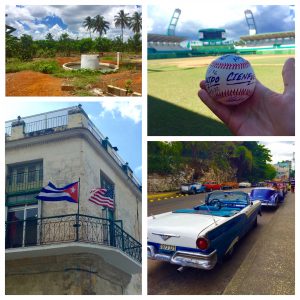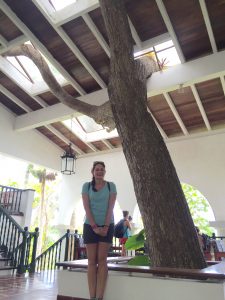Post contributed by Kaitlin Robb, Office of Sustainability Intern
When I decided to study abroad, I wanted to go somewhere unique. I’ve always dreamt of visiting Greece or Italy, mostly because of the food, but I knew I had one chance to study abroad and needed to choose wisely. When I heard about the Honors College trip to Cuba, I was instantly intrigued; this was the kind of trip I had been looking for. With tensions between the two countries loosening, this was a rare chance to see Cuba before the United States could influence it. I signed up for the trip before the fear of studying abroad could change my mind.
Our trip instructor, Dr. Tiffany Sippial, spent a semester teaching our group about Cuba before our two-week trip in May 2016. We could each choose a topic to study and present on, as well as investigate while overseas. With my sustainability minor and passion, I decided to research Cuba’s sustainability. Cuba is known as the “great sustainability experiment.” Their complicated history means they spent a lot of time cut off from the rest of the world (due mostly to the U.S. trade embargo). It was necessary to use sustainable farming and building practices in order to adapt. After the embargo took effect, Cuba became reliant on the Soviet Union (USSR). They exported sugar from their vast plantations and imported oil in return. When the USSR collapsed, the sugar was useless, as they needed agricultural land to feed their people. Without pesticides from the Soviet Union, they needed to use organic farming methods. The loss of oil forced them to conserve energy, if only because they did not have access to more. In fact, in the 1990s, the government replaced all the incandescent light bulbs in the country with CFLs to deal with energy shortages. I was excited to see this great experiment, and when it came time to board the plane in Miami, I was less afraid than I thought I would be, and ready to experience the uniqueness of Cuba.

Cuba held many rich experiences: sustainable farm in Varadero; Cienfuegos baseball stadium; classic American cars on the streets of Havanna; and historical buildings at the Old Havanna UNESCO Heritage Site (clockwise from top left).
Every experience I had in Cuba ended up being once-in-a-lifetime. We hiked all over Cuba, visiting protected areas across the country. The resourcefulness of the Cubans stood out to me, and was demonstrated when we went hiking in the Escambray Mountains. The steps of the path were actually made of recycled air conditioning units; nothing went to waste there. Additionally, the natural beauty of Cuba was something to admire. There was so much undeveloped coastline and diverse ecosystems. We went for a hike in the Sendero Enigma de Las Rocas and our guide could pick up every bird sound, stopping to identify it for us and answer its call.
In fact, the people provided the best experiences in Cuba. We visited the Cienfuegos baseball stadium, and they were so happy that we purchased some memorabilia they let us on the field to meet the players during their practice. In Trinidad, we visited a pottery shop where one family had been making pottery for 500 years. The grandfather invited us to use his pottery wheel, gently placing his hands on ours to share his techniques, even though he spoke no English.
One of my favorite experiences turned out to be visiting a sustainable farm outside of Varadero. Water there ran under the pig pen to collect the waste into a vat to convert into biofuel, which in turn fueled the farm. The small farm needed to save on energy, and came up with this idea out of necessity. They grew organic pineapple and coconut as well, and my favorite dessert came from this farm: a coconut and sugar-water dish made from coconuts grown right on property. This great example demonstrated how pure resourcefulness in Cuba manifested as sustainability.
We also visited La Moka, an amazing example of community-based ecotourism. La Moka is a hotel that was built without cutting down a single tree. In fact, a large tree comes right through the middle of the lobby. I talked with a few locals, who are happy due to the high employment rates and the collectiveness of the community. The hotel blends seamlessly with the community, as the government even polled the residents to see if they would be okay with a new hotel being built.
It was really the people that taught me about life in Cuba. We stayed in casas, essentially bed and breakfasts, with generous families that made us eggs every morning. We had two Cuban guides for our 11 students, as well as two Cuban drivers who didn’t speak English, but still shared their culture through means like music. These people talked candidly with us about the pros and cons of living in a communist country, from having free healthcare and education to not being able to start their own business or even download music. This is a trade-off in Cuba. Castro protects a lot of the land for the environment, and there aren’t a lot of tall, industrial buildings, but there is a lack of housing, almost no internet, and limited resources.
In a 2006 World Wildlife Fund report, Cuba was the only country in the world to meet the guidelines for sustainable development; meaning they meet their needs without compromising the ability of future generations to meet their own needs. My experience in Cuba in some ways backs this up. They are incredibly resourceful, have low energy usage, and have a lot of natural, protected areas. However, they also have very limited access to the Internet, arguably the greatest tool for free speech. They have far too little housing, and with an average monthly income of $30, free education doesn’t matter when they can’t afford to travel to school. Therefore, perhaps meeting the criteria for sustainable development does not a sustainable country make. However, the experiences I had in Cuba, the beautiful ecosystems, and the welcoming people made this the trip of a lifetime, and one I recommend to anyone ready for a trip different than anything you’ve ever experienced before.
If you’re interested in joining the Honors College for the 2017 Study Abroad to Cuba, email Ken Thomas.





